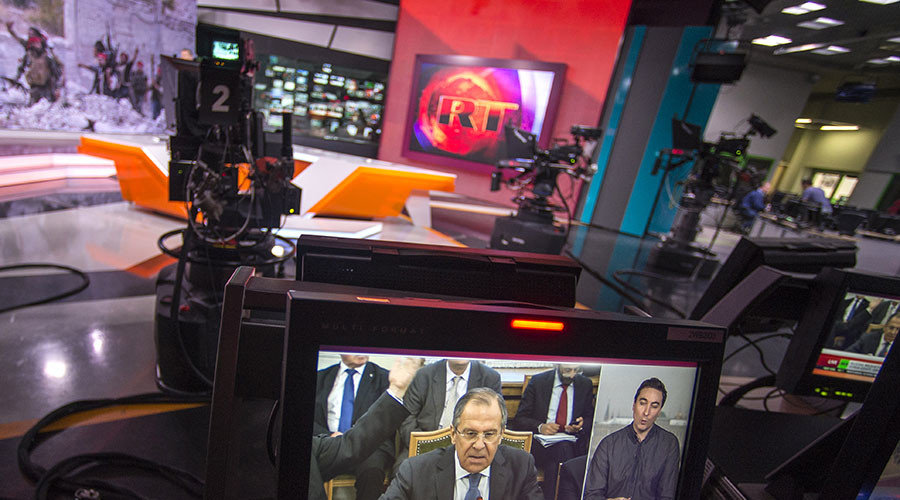Det tyske ungdomsmagasin, Neon, plantede journalist Martin Schlak ved RT Deutch's kontor i Berlin. Hans mission var at finde ud af, hvordan "Ruslands sandhed" - for at bruge hans eget udtryk, - fremstilles.
"Jeg er en spion," indrømmer Schlak.
Han skriver, han var ivrig efter at finde ud af, om RT's daglige arbejde ville leve op til de udtryk, som de tyske medier bruger om det, så som "Putins propaganada-sender" og "Kremls våben til hybrid krigsførelse."
Kommentar: Delvist oversat af Sott.net fra German journalist poses as intern to spy on RT Deutsch but turns into mainstream media doubter in only two days
Senere i artiklen citeres Martin Schlak for at skrive:
"Jeg tøver nu i forhold til, hvad jeg anser for sandt," siger Schlak. "Hvem lyver og hvem skriver sandheden? Jeg ved det ikke længere."
[...]
"Er jeg for hurtig til at kalde det propaganda, fordi Rusland, dette enorme rige, er ukendt for mig?"
To do that, Schlak enrolled as an intern and became "Putin's man" for several weeks.
"What did I actually imagine would be there? A fax in the middle of the newsroom, sending orders from the Kremlin every minute?" Schlak asks himself ironically.
Reality turned out to be a bit more mundane. The self-styled spy mentions friendly co-workers, coffee machines and an intelligent chief editor speaking perfect German.
In the friendly atmosphere, Schlak's cover appeared unexpectedly flimsy.
"I'm asking myself whether you're a spy sent to us by the Bild newspaper," an RT Deutsch employee joked, given how many questions Schlak was asking.
Fearing for his guise, the 'mole' tried to act by the playbook - but then something quite unexpected happened.
"I'm now hesitating about what I deem true," Schlak said. "Who lies and who writes the truth? I don't know anymore."
"I trust my new colleagues - who I have known for only a couple of days - more than all of Germany's large news agencies put together," he says.
"Deutsche Welle is the taxpayer-funded international broadcaster in charge of giving coverage to the German and other perspectives on politics, culture and economy," his article goes on. "Is it exactly the same what RT is doing, to promote understanding of Russia's position?"
"Do I rashly call it propaganda because Russia, this giant kingdom, is foreign to me?"
The conundrum even drove Schlak to seek a psychologist's help. He turned to Markus Appel, a psychology professor at the University of Koblenz-Landau.
"A human being has an inclination not to comply with the majority," Appel said, citing a number of scientific experiments that examined human behavior in groups.
RT Deutsch - RT's German branch - was launched in November 2014 to offer the German audience an alternative to mainstream online news and comments. Before it was launched, over 30,000 people signed a petition for RT to start a German-language channel.
In 2015, RT Deutsch's YouTube channel had over 20 million views and 44,000 subscribers.
The channel immediately drew criticism from German politicians, who claimed that its programs were one-sided and "biased towards Russia's position." This even led to a probe into a regional channel that aired an RT Deutsch show. No breach of broadcast laws was found.
The mainstream German media's own bias against Russia has been exposed in numerous cases. In February 2016, a retired head of the popular German broadcaster ZDF, Dr Wolfgang Herles, admitted the network and other German media outlets take orders from the government on what, and what not, to report.
During the Ukrainian crisis, the head of the influential Süddeutsche Zeitung's foreign policy department, Stefan Kornelius, put himself in the spotlight by taking an extremely one-sided stance in numerous reports.
Harald Schumann, formerly a journalist for Der Spiegel (considered the most influential political weekly in Germany), said in an interview that he had been de facto censored when he worked for the publication, and criticized the lack of freedom of the press in Germany.




Kommentar: This poor guy must have suffered a serious case of cognitive dissonance.